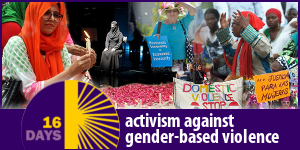Women and the 'Arab Spring'
Women's Movement Building
debates and strategies
Voices for change in the UK
Structures of Sexism
AIDS, gender and human rights
With the right care, people with HIV can live long and fully productive lives. Yet the gulf between science and practice remains, and more women than ever have HIV. openDemocracy 50.50 explores the ways in which global policies ignore the gender dimensions of this pandemic, and the impact this has on women's human rights.
- 1 of 3
- ››












































.jpg)